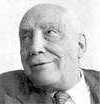Salama Moussa
| Salama Moussa | |
|---|---|
 |
|
| Born | 1887 Zagazig, Egypt |
| Died | 4 August 1958 Cairo, Egypt (aged 71) |
| Occupation | Journalist |
| Nationality | Egypt |
| Notable works | Man at the Top of Evolution |
Salama Moussa (or Musa; 1887 – 4 August 1958) (Arabic: سلامه موسى pronounced [sæˈlæːmæ ˈmuːsæ]), born into a wealthy, land owning Coptic family in the town of Zagazig located in the Nile delta, Egypt. Salama Musa was a journalist, writer, advocate of secularism, and pioneer of Arab socialism. He wrote or translated 45 published books; his writings still influence Arab thought and he is frequently referred to. Salama Musa campaigned against traditional religion and urged Egyptian society to embrace European culture. He looked for political and economic independence of Egypt from the British colonization. To this end he corresponded with Gandhi who provided him with his tools of economic struggle against the British hegemony over the Indian textile industry. Mousa made use of his contact with Gandhi in helping out the national Egyptian industrialist Tala'at Harb (1867-1941) to set up independent outlets for the Egyptian textile industry nationwide in Egypt - an attempt that was vehemently resisted by the British colonial powers of the time. Mousa pleaded, for instance, in his book Ha'ula'i 'allamuni (Those who inspired me, Cairo, 1953) for the independence of thought and indigenous creativity of the contemporary Egyptians and Arabs. Mousa went in his youth to England and adhered there to Bernard Shaw's Fabian Society.
Musa's father died when Salama Musa was still a young child, leaving the family an inheritance that allowed them to live comfortably. Salama Musa received his elementary education in a Coptic school, but in 1903 he moved to Cairo to receive a secondary education. The Khedivial College where Musa attended was run like a military camp with harsh punishment for misbehavior dished out by the British instructors. In Cairo during the early 20th century there was rising anti-British sentiment rooted in the nationalist movement, and Qasim Amin's movement for the liberation of women was creating a stir. While in Cairo, Musa was exposed to writers such as Farah Antun, Jurji Zaydan, and Ahmad Lutfi Al-Sayyid that discussed modern and at the time radical ideas such as Social Darwinism, women’s rights, and nationalism. Growing up as a religious minority in Muslim dominated Egypt he was attracted to these ideas. After secondary school Musa was interested in studying European literature and science, but was unable to receive a postsecondary education in Egypt, because this advanced education was monopolized by Al Azhar and Dar al-‘ulum, both of which required students to be Muslim.
...
Wikipedia
